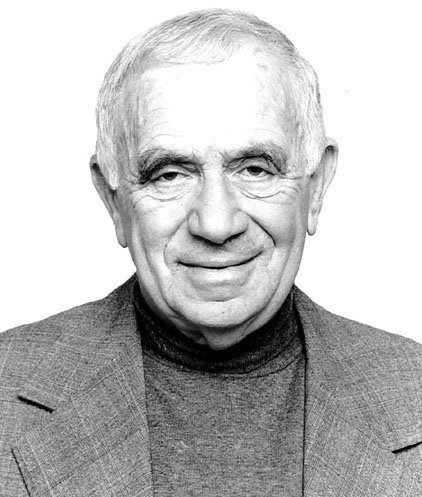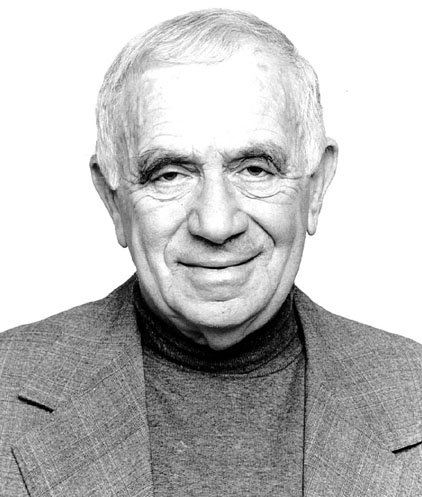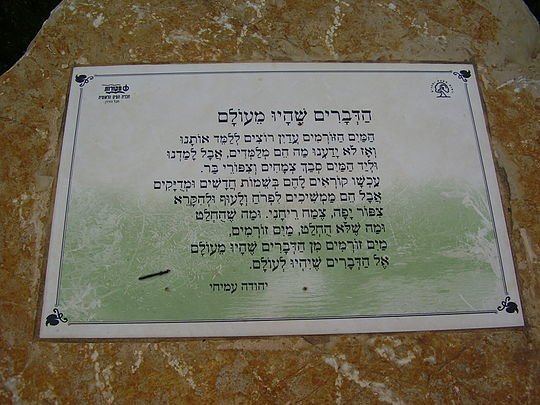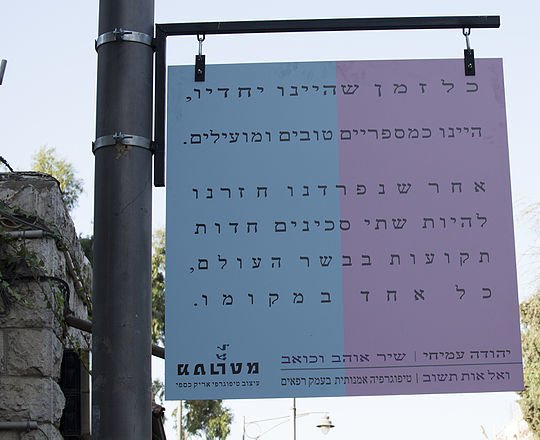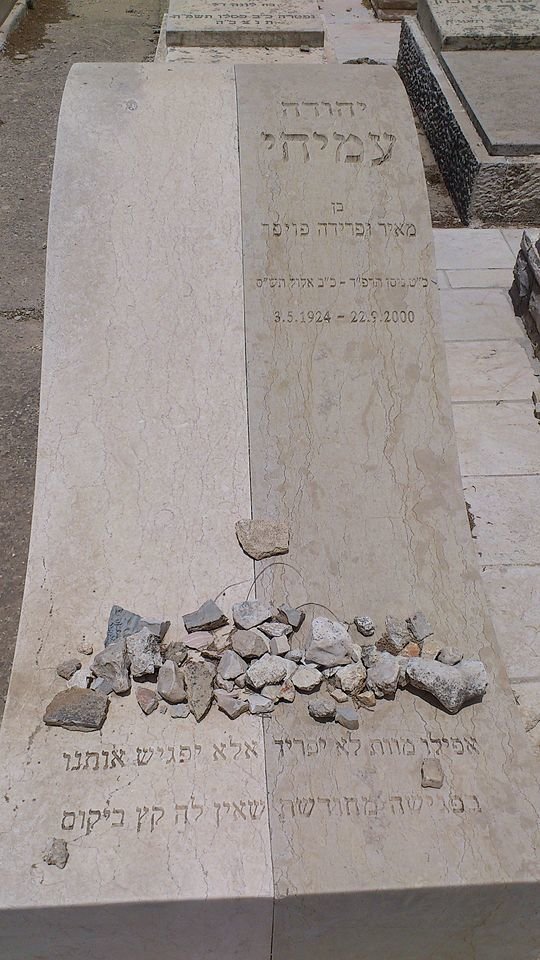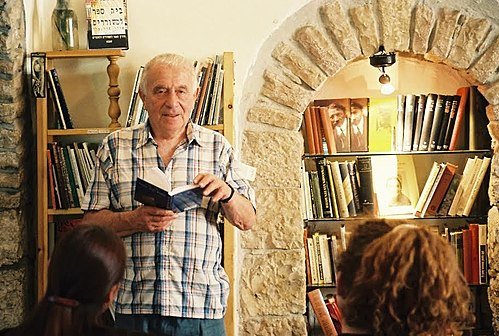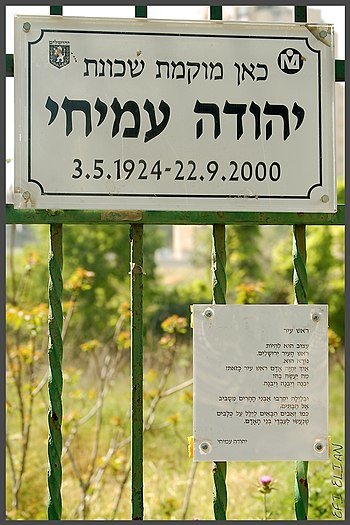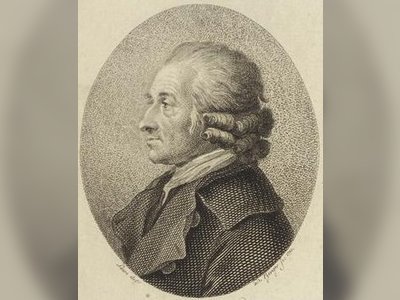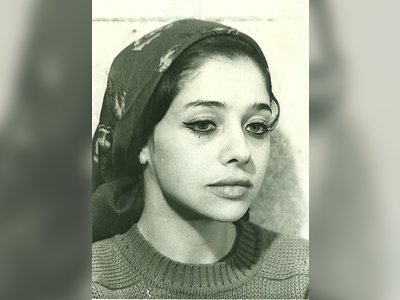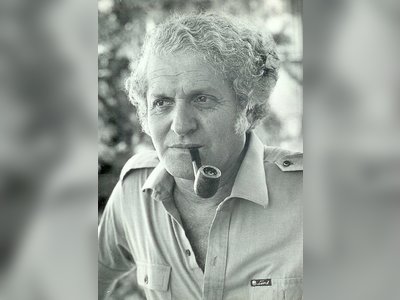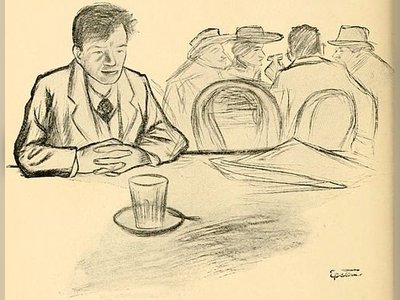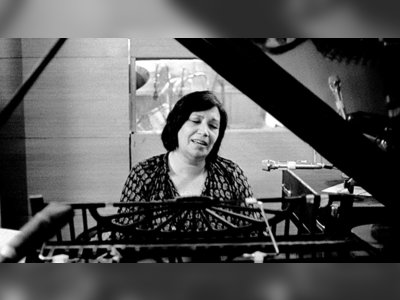מורשת גדולי האומה
בזכותם קיים
beta
Yehuda Amichai
Yehuda Amichai (May 3, 1924 – September 22, 2000) was an Israeli poet, writer, and playwright, and a recipient of the Israel Prize for Poetry (1982). He is considered a trailblazer and a revolutionary figure in modern Hebrew poetry and is counted among the prominent poets of the 20th century worldwide.
From the place where we are right, flowers will never grow in the spring... but doubts and loves make the world bloom like spring, like cherry blossoms.
Yehuda Amichai was born as Ludwig Pfeuffer in Würzburg, Germany, to an Orthodox Jewish family. In his childhood, he attended a kindergarten and a Jewish school, where he studied Hebrew and German. The family immigrated to the Land of Israel when he was 11 years old. Initially, they settled in Petah Tikva, and later moved to Jerusalem. Amichai completed his high school education at the religious high school, Ma'aleh, in Jerusalem.
During World War II, after completing his high school studies, in 1942, he volunteered for the British Army and served in Egypt. Among other responsibilities, he was involved in smuggling weapons and clandestine immigration. After his release, he studied teaching at the Kerem Institute in Jerusalem, specializing in teaching soldiers who had served in the British Army. With the outbreak of the Israeli War of Independence in 1948, he joined the Israel Defense Forces and served as a combatant in the Negev Brigade of the Palmach until the end of the war. During his service, he participated in the difficult Battle of Hulikat, in which his friend and commander, Dicky Lachover, was killed. This event left a deep impact on Amichai and was reflected in his poetry, notably in his famous poem "Rain on a Battle Field."
After his discharge from the IDF, he studied literature and Bible at the Hebrew University of Jerusalem. He worked as a teacher at the Hebrew Gymnasium in Jerusalem, the Seminar for Overseas Teachers, and the School for Foreign Students at the Hebrew University. Additionally, he was a visiting lecturer on creative writing at various universities worldwide, including New York University, the University of California, Berkeley, and Yale University.
In 1955, he published his first book, "Now and in Other Days," which marked a revolution in Hebrew poetry. In 1957, he received the Shlonsky Prize for this work. He was the first of his generation of poets to be awarded the Israel Prize in 1982, with judges praising him for "creating a new direction in Hebrew poetry" and for "bringing a revolutionary change to the language of liturgical poetry, combining liturgical and everyday materials."
Amichai's books of poetry were frequently featured in bestseller lists published in newspapers such as "Haaretz" and "Yedioth Ahronoth."
In February 1988, during the first intifada, he and other writers, including Amos Oz, A. B. Yehoshua, and Amos Elon, published a joint letter in The New York Times, urging American Jews to "speak out" about Israel's policies in the territories.
Amichai is the most widely translated Israeli poet, with his works translated into approximately 40 languages, including English, Spanish, French, and German. International conferences dedicated to his poetry were held at Oxford University in 1994 and at Yale University in 2007. Although he was never awarded the Nobel Prize in Literature, he was nominated multiple times.
His poetry has become part of the curriculum in general high schools in the United States and Japan, and his works are taught in colleges and universities worldwide. Israeli Prime Minister Yitzhak Rabin, who won the Nobel Peace Prize in 1994, invited Amichai to read his poetry at the award ceremony in Oslo. Among the poems he read was "God Has Pity on Kindergarten Children." Many of his translated poems have been broadcast on radio stations worldwide, and his poems have been published in various languages in numerous magazines, including The New Yorker, The New Republic, and The New York Times.
Yehuda Amichai passed away on September 22, 2000, and was buried with a state funeral in Sanhedria Cemetery in Jerusalem. One year after his death, in September 2001, Israel issued a stamp in his memory. The Yehuda Amichai Poetry Prize, established jointly by the Ministry of Education and the Jerusalem Municipality, is awarded annually.
His literary archive was sold to Yale University and is housed in the Beinecke Rare Book & Manuscript Library's World Poetry Archives.
Amichai left behind three children from his two marriages, with Hana Szenes and Tamar. He resided in the Yemin Moshe neighborhood of Jerusalem.
Yehuda Amichai brought a revolutionary change to Hebrew poetry in the 1950s. He emphasized the poetry of the "I" in a generation that had focused on the poetry of the "we," collective ideology, and myth. He employed original modern imagery to describe the emotions and situations of the individual. His first two collections of poems, "Now and in Other Days" (1955) and "Not of This Time, Not of This Place" (1958), embody this change.
Amichai quickly became a popular and well-known poet in Israel and abroad. His poetry reflected the zeitgeist of readers seeking a new expression for their changing world. Literary scholar Gershon Shaked said of him, "We learned from him that it is possible to convey profound and sensitive ideas in simple words, without rhetorical grandeur: that there is no need for cannons, and it is better to speak in human language." In addition to his books of poetry, Amichai published several novels, plays, and radio plays.
His works have been translated into many languages (around 40) including English, Spanish, French, and German.
The radio plays "Bells and Trains," "The Day Martin Buber Was Buried," and "To Kill That Man" were staged in New York and Toronto in 2000–2001.
In 2020, Amichai's radio play "Bells and Trains" was remounted as part of a literary series. His poems have been set to music and performed in Israel and around the world in more than 160 compositions, including "Performance Called Future," "Remembrance of Love: Vision," "Water Surface," "Rain on a Battle Field," and "Accompany Me Jerusalem."
In 2007, the Cameri Theatre organized, produced, and performed a tribute to Yehuda Amichai.
Yehuda Amichai was born as Ludwig Pfeuffer in Würzburg, Germany, to an Orthodox Jewish family. In his childhood, he attended a kindergarten and a Jewish school, where he studied Hebrew and German. The family immigrated to the Land of Israel when he was 11 years old. Initially, they settled in Petah Tikva, and later moved to Jerusalem. Amichai completed his high school education at the religious high school, Ma'aleh, in Jerusalem.
During World War II, after completing his high school studies, in 1942, he volunteered for the British Army and served in Egypt. Among other responsibilities, he was involved in smuggling weapons and clandestine immigration. After his release, he studied teaching at the Kerem Institute in Jerusalem, specializing in teaching soldiers who had served in the British Army. With the outbreak of the Israeli War of Independence in 1948, he joined the Israel Defense Forces and served as a combatant in the Negev Brigade of the Palmach until the end of the war. During his service, he participated in the difficult Battle of Hulikat, in which his friend and commander, Dicky Lachover, was killed. This event left a deep impact on Amichai and was reflected in his poetry, notably in his famous poem "Rain on a Battle Field."
After his discharge from the IDF, he studied literature and Bible at the Hebrew University of Jerusalem. He worked as a teacher at the Hebrew Gymnasium in Jerusalem, the Seminar for Overseas Teachers, and the School for Foreign Students at the Hebrew University. Additionally, he was a visiting lecturer on creative writing at various universities worldwide, including New York University, the University of California, Berkeley, and Yale University.
In 1955, he published his first book, "Now and in Other Days," which marked a revolution in Hebrew poetry. In 1957, he received the Shlonsky Prize for this work. He was the first of his generation of poets to be awarded the Israel Prize in 1982, with judges praising him for "creating a new direction in Hebrew poetry" and for "bringing a revolutionary change to the language of liturgical poetry, combining liturgical and everyday materials."
Amichai's books of poetry were frequently featured in bestseller lists published in newspapers such as "Haaretz" and "Yedioth Ahronoth."
In February 1988, during the first intifada, he and other writers, including Amos Oz, A. B. Yehoshua, and Amos Elon, published a joint letter in The New York Times, urging American Jews to "speak out" about Israel's policies in the territories.
Amichai is the most widely translated Israeli poet, with his works translated into approximately 40 languages, including English, Spanish, French, and German. International conferences dedicated to his poetry were held at Oxford University in 1994 and at Yale University in 2007. Although he was never awarded the Nobel Prize in Literature, he was nominated multiple times.
His poetry has become part of the curriculum in general high schools in the United States and Japan, and his works are taught in colleges and universities worldwide. Israeli Prime Minister Yitzhak Rabin, who won the Nobel Peace Prize in 1994, invited Amichai to read his poetry at the award ceremony in Oslo. Among the poems he read was "God Has Pity on Kindergarten Children." Many of his translated poems have been broadcast on radio stations worldwide, and his poems have been published in various languages in numerous magazines, including The New Yorker, The New Republic, and The New York Times.
Yehuda Amichai passed away on September 22, 2000, and was buried with a state funeral in Sanhedria Cemetery in Jerusalem. One year after his death, in September 2001, Israel issued a stamp in his memory. The Yehuda Amichai Poetry Prize, established jointly by the Ministry of Education and the Jerusalem Municipality, is awarded annually.
His literary archive was sold to Yale University and is housed in the Beinecke Rare Book & Manuscript Library's World Poetry Archives.
Amichai left behind three children from his two marriages, with Hana Szenes and Tamar. He resided in the Yemin Moshe neighborhood of Jerusalem.
Yehuda Amichai brought a revolutionary change to Hebrew poetry in the 1950s. He emphasized the poetry of the "I" in a generation that had focused on the poetry of the "we," collective ideology, and myth. He employed original modern imagery to describe the emotions and situations of the individual. His first two collections of poems, "Now and in Other Days" (1955) and "Not of This Time, Not of This Place" (1958), embody this change.
Amichai quickly became a popular and well-known poet in Israel and abroad. His poetry reflected the zeitgeist of readers seeking a new expression for their changing world. Literary scholar Gershon Shaked said of him, "We learned from him that it is possible to convey profound and sensitive ideas in simple words, without rhetorical grandeur: that there is no need for cannons, and it is better to speak in human language." In addition to his books of poetry, Amichai published several novels, plays, and radio plays.
His works have been translated into many languages (around 40) including English, Spanish, French, and German.
The radio plays "Bells and Trains," "The Day Martin Buber Was Buried," and "To Kill That Man" were staged in New York and Toronto in 2000–2001.
In 2020, Amichai's radio play "Bells and Trains" was remounted as part of a literary series. His poems have been set to music and performed in Israel and around the world in more than 160 compositions, including "Performance Called Future," "Remembrance of Love: Vision," "Water Surface," "Rain on a Battle Field," and "Accompany Me Jerusalem."
In 2007, the Cameri Theatre organized, produced, and performed a tribute to Yehuda Amichai.
- יהודה עמיחי – ויקיפדיהhe.wikipedia.org
